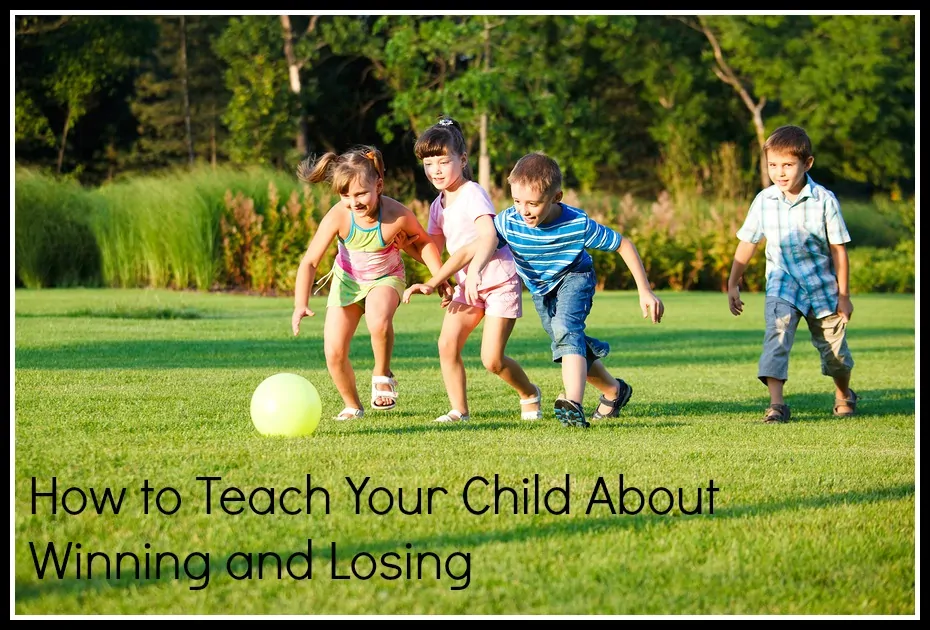This post may contain affiliate links. Read my disclosure policy here.
This guest post was submitted by Jude Bijou, MA, MFT
Our kids are exposed to bad losers all the time–not only in their sports leagues or skating competitions, but also on TV. They see reality show contestants throw tantrums and professional athletes trash their teammates or coaches for losing.
With such poor role modeling, how can parents teach kids to be good losers? We can start by helping kids understand the basic reasons for bad losers’ behavior. Sore losers think they’re special. They believe the whole world should agree and bow down to them. When they don’t win and aren’t acknowledged for how special they are, they get angry, because it feels like an injustice.

Here are six simple lessons to teach to kids that will help them be good losers.
Deal with inevitable emotions.
Let your child know that it’s okay and healthy to feel and express anger and frustration at losing, but in a safe and private place. Show him how to have that temper tantrum on his own. For example, he can punch a punching bag at home in the basement and yell at the top of his lungs, “I feel so angry!” He’ll feel relieved after he lets all that emotional energy out, and much better than if he took out his frustration and rage on someone else.
Have fun.
Running in a race on a beautiful day, feeling healthy and alive, should be fun. Remind your child that the activity she loves is fun, and that she can put less emphasis on “winning.” When she thinks this way, even the practices leading up to the tournament can just be about fun and doing her best. No matter how disappointing the outcome, she’ll have had joyous moments and great memories leading up to it.
Focus on trying.
Resilient people–those who bounce back easily from disappointments and setbacks–aren’t wedded to the outcome. Don’t let your child set himself up for disappointment with the expectation that he’ll win. Teach him that giving it his maximum effort is the only thing he can control. If he does win, that’s a wonderful bonus and shows that hard work pays off.
Look for the benefit.
Your child won’t always get what she wants, but she can always benefit from trying. Ask her, “What did you learn?” Most competitive kids can come up with an answer that’s helpful. There’s always a win for your child personally, whether it’s honing her skills, learning something about her technique, or figuring out a different and better strategy for next time.
Congratulate yourself.
If a child’s sense of well-being is dependent upon external recognition, he’ll set himself up for disappointment and will always be at the mercy of outside sources for self-worth and happiness. If he’s having a particularly difficult time letting go of negative feelings, have him repeat over and over to himself: “I gave it my best shot. I did well to get as far as I did.”
Join in the celebration.
Being a gracious loser centers around the ability to celebrate someone else’s good fortune, despite the disappointment one feels. It’s fine for a kid to acknowledge her disappointment at losing, but not to diminish the success or joy of the winner. Remind her that if she won, she’d want and expect others to congratulate her too.
What tips do you have to share about teaching your children about winning and losing?
Jude Bijou, MA, MFT, is a respected psychotherapist, professional educator, and workshop leader. Her theory of Attitude Reconstruction® evolved over the course of more than 30 years working with clients as a licensed marriage and family therapist, and is the subject of her award-winning book, Attitude Reconstruction: A Blueprint for Building a Better Life. Learn more at www.attitudereconstruction.com
Photo credit










Carla says
thank you for sharing, very informative.
My Baby Pajamas says
I am so glad you addressed this subject. I believe kids need to learn to be good losers and this whole “everyone is a winner” is just setting up kids for disappointment later in life. We tell our boys it’s okay to lose as long as they tired and did their best. It’s about having fun!
Ned says
It is really sad how everyone you turn around you see people setting such a wrong example for kids. The worst part how this sour loser behavior is shown as something “cool” on TV.. Its so easy for kids to emulate such behavior.
Its important for parents at least to teach their kids the importance of winning but also how to lose gracefuly